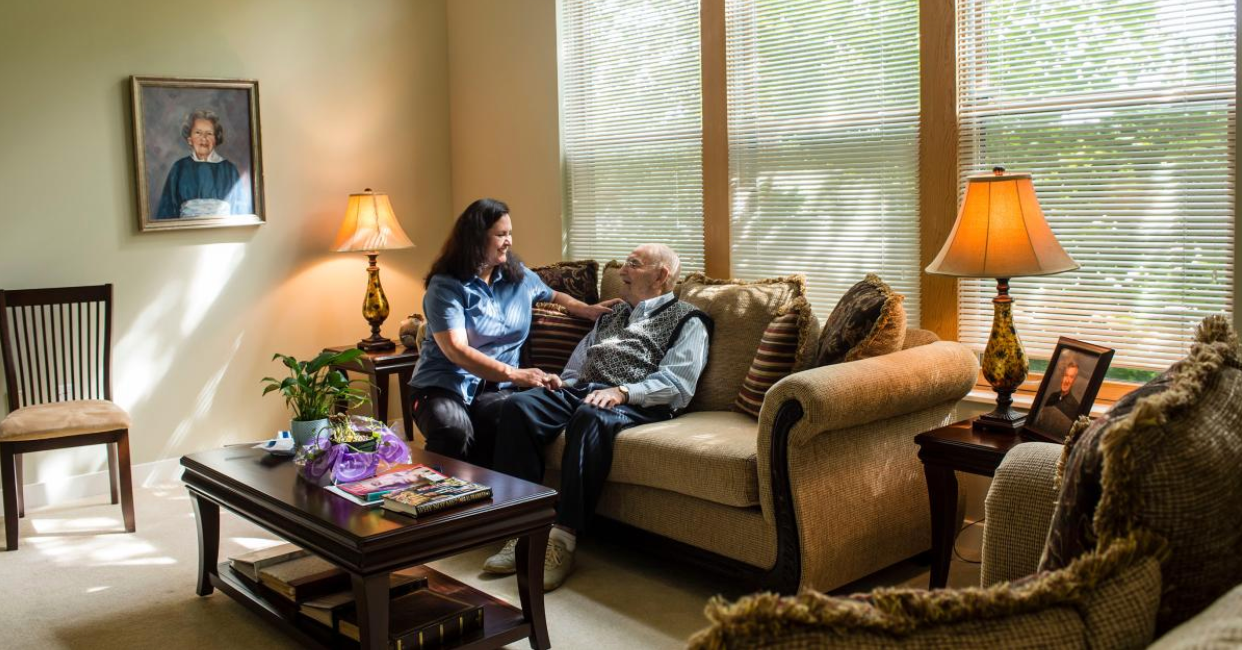Effective Communication for Alzheimer's and Dementia Care
Effective Communication For
Alzheimer's And Dementia Care
At 7 Day Home Care, we emphasize the vital importance of employing experienced, knowledgeable, and skilled home health aides for in-home Alzheimer's and dementia care, particularly regarding communication. Effective communication is a cornerstone of dementia care, as individuals with these conditions often struggle with memory, comprehension, and expression. Skilled aides are trained to use compassionate, patient-centered communication techniques that include speaking slowly, using simple and clear language, and employing non-verbal cues such as eye contact and touch to connect with clients. These aides understand the nuances of dementia-related behaviors and can calmly address agitation, confusion, and anxiety, creating a reassuring and supportive environment. Their expertise allows them to recognize and respond to the unique needs of each individual, ensuring that care is not only effective but also respectful and empathetic. This level of communication proficiency enhances the overall well-being of clients, fosters trust, and improves the quality of interactions, making the home a safer and more comforting place for individuals living with Alzheimer's and dementia. At 7 Day Home Care, our commitment to providing such high-caliber, specialized care underscores our dedication to improving the lives of our clients and their families in Manhattan, Queens, Brooklyn, and Long Island, New York.

Are You Searching For Home Health Aides Near Me Who
Can Effectively Communicate with Specialized Skill in Dementia Care?
Caring for individuals with Alzheimer's or dementia requires specialized knowledge and skills, particularly when it comes to communication. Effective communication techniques play a crucial role in establishing meaningful connections, reducing anxiety, and enhancing the overall well-being of patients. As a trusted provider of Alzheimer's and dementia in-home care services, 7 Day Home Care understands the significance of caregiver-patient communication. In this article, we will delve into the essential strategies and techniques that caregivers can employ to communicate most effectively with Alzheimer's and dementia patients. We will also provide well-sourced statistics to highlight the importance of effective communication in dementia care. 7 Day Home Care is licensed by the New York State Department of Health to provide in-home care services in Manhattan, Queens, Brooklyn, Nassau County, and Suffolk County, New York.
1. Use Simple and Clear Language:
When communicating with individuals who have Alzheimer's or dementia, it is essential to use simple and concise language. Keep sentences short and focus on one idea at a time. Using familiar words and avoiding complex phrases or jargon will help patients understand and respond more easily. According to the Alzheimer's Association, by 2050, the number of Americans aged 65 and older with Alzheimer's is projected to reach 13.8 million. Clear and straightforward communication techniques can significantly improve the quality of life for patients and caregivers alike.
2. Maintain a Calm and Patient Demeanor:
Maintaining a calm and patient demeanor during interactions is vital for effective communication. People with Alzheimer's or dementia may experience confusion or frustration, leading to agitation or verbal outbursts. It is crucial for caregivers to remain composed, speak softly, and approach the patient with kindness and empathy. Research published in the Journal of Gerontological Nursing suggests that compassionate and patient communication can help reduce anxiety and behavioral symptoms in individuals with dementia.
3. Use Nonverbal Communication:
Nonverbal cues can be powerful tools for communicating with Alzheimer's or dementia patients. Utilize facial expressions, gestures, and touch to convey warmth, reassurance, and understanding. Maintaining eye contact and using a gentle and soothing tone of voice can also enhance communication and help patients feel more comfortable. The Alzheimer's Society reports that nonverbal communication, such as touch and visual cues, can be more effective than verbal communication alone in conveying messages to individuals with dementia.
4. Maintain a Structured Routine:
Establishing a structured routine can provide a sense of security and familiarity for individuals with Alzheimer's or dementia. Clear and consistent schedules for daily activities, meals, and social interactions can enhance communication by reducing confusion and anxiety. According to the World Health Organization, an estimated 50 million people worldwide have dementia, and nearly 10 million new cases are reported each year Implementing a structured routine tailored to the individual's needs can improve communication and overall well-being.
5. Engage in Active Listening:
Active listening is a fundamental aspect of effective communication. Pay close attention to the patient's verbal and nonverbal cues, and respond with empathy and understanding. Reflective listening, summarizing, and using open-ended questions can encourage patients to express themselves and maintain a sense of connection. A study published in the Journal of the American Geriatrics Society found that active listening techniques promote a sense of empowerment and satisfaction in individuals with dementia.
Effective communication is paramount when caring for individuals with Alzheimer's or dementia. By employing strategies such as using simple language, maintaining a calm demeanor, utilizing nonverbal cues, establishing a structured routine, and engaging in active listening, caregivers can foster meaningful connections and enhance the well-being of their patients.
Remember, 7 Day Home Care provides specialized Alzheimer's and dementia in-home care services in Manhattan, Brooklyn, Queens, Nassau County, and Suffolk County, New York. Our experienced caregivers are trained in effective communication techniques and are dedicated to providing compassionate care tailored to the unique needs of each individual. Call 516-408-0034 to learn more about our specialized in-home Alzheimer's and dementia care near you.
Brian Callahan
7 Day Home Care










